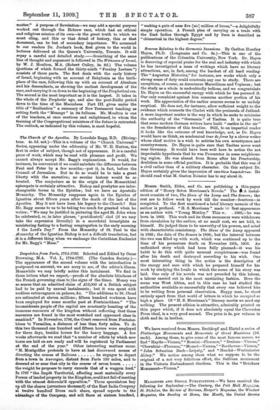Sources Relating to the Germanic Invasions. By Carlton Huntley Hayes,
Ph.D. (Longman and Co. 6s.)—This is one of the publications of the Columbia University, New York. Dr. Hayes is deserving of especial praise for the zeal and industry with which he has investigated a mass of writings which have no literary attractions, are, in fact, among the hardest of all hard reading. The " Augustan Histories," for instance, are works which only a strong sense of duty could constrain any one to study. There are exceptions, of course, as Ammianus Marcellinus and Vopiscus ; but the study as a whole is undoubtedly tedious, and we congratulate Dr. Hayes on the successful energy with which he has pursued it. Our only complaint against him concerns another portion of his work. His appreciation of the earlier sources seems to us unduly sceptical. He does not, for instance, allow sufficient weight to the evidence which connects the Cimbri with the peninsula of Jutland. A more important matter is the way in which he seeks to minimise the authority of the " Germania " of Tacitus. It is quite true that some modern German writers have built " castles in the air " on the foundations of this treatise. Still, to an impartial reader it looks like the outcome of real knowledge, not, as Dr. Hayes would have us think, an academical tour de force by a clever writer whose chief motive is a wish to satirise his own countrymen and countrywomen. Dr. Hayes is quite sure that Tacitus never went near Germany. It would have been well here to notice the not improbable hypothesis that he was Procurator in some neighbour- ing region. He was absent from Rome after his Proctorship, doubtless in some official position. It is probable that this was of a civil rather than of a military character. On this subject Dr. Hayes certainly gives the impression of one Oices ataasactrewv. He should read what M. Gaston Boissier has to say about it.






































 Previous page
Previous page